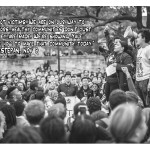A collaboration between Students for Justice in Palestine, Jewish Voice for Peace, and Tree of Life brought activists Nadya Tannous and Amanda Weatherspoon to New Haven for a stop in their 18-city speaking tour “No Child Behind Bars: Living Resistance from the US to Palestine” on February 1st.
Tannous and Weatherspoon were originally set to speak alongside Ahed Tamimi, a 16-year-old activist living in the West Bank Palestinian village Nabi Saleh, but the United States State Department denied Tamimi a visa to enter shortly before the start of the tour. The activists screened a five-minute film featuring Tamimi speaking on solidarity, resistance, and her own life in occupied Palestine.
The event, held in WLH’s Sudler Hall and attended by around 50 people from Yale and New Haven, began with solidarity statements from Maya Jenkins, the social justice chair of the Black Student Alliance at Yale and Haylee Kushi the president of the Association of Native Americans at Yale. Jenkins noted the longstanding alliance between black and Palestinian activists, whereas Kushi emphasized the need for solidarity among population enduring settler colonialism.
Tannous organizes and researches the detention of Palestinian minors with a focus on children who she says may be detained at ages as young as ten years old. During her talk, she described the situation in Palestine and then provided strategies and examples of how organizers can work together to tackle “the same root of oppression.” According to Tannous, Tamimi, who leads weekly marches against occupation in Nabi Saleh, has been arrested multiple times. Sometimes Palestinian families will go years without learning the whereabouts or well-being of detained children.
Weatherspoon, a Black Unitarian Universalist minister, focuses her ministry on collective liberation and cross-movement solidarity; she cited her ministry as rhetoric experience, and broke down abstract concepts about activism into simple metaphors during her talk. “I’m a minister,” she said, “so I love to use metaphors.” Weatherspoon described the difficulty of understanding what exactly it means to “dismantle racism” or “tackle oppression,” since those terms encompass many complicated structures. She encouraged the audience to think about oppression as a brick wall, with many different pieces, and vulnerable to falling with the removal of individual bricks.
In her talk, Weatherspoon focused on the mutually-supporting “bricks” of structural racism, state enforcement, and corporate profit, and the respective examples of redlining, school-to-prison pipeline, and private prisons. The school-to-prison pipeline describes a system where youth of color are more likely to be incarcerated following being in an educational system that punishes them through criminalization. Weatherspoon traced the origins of the school-to-prison pipeline to the issue of redlining which describes the systemic denial of loans and other services to Black and other people of color. Low-income families of color are steered away from wealthier, whiter neighborhoods which receive better resources and live in higher-tax-collecting districts, read: better schools. As a result, students of color are pushed into lower performing schools. More people in prison, then, feeds a prison-industrial complex in which private prisons profit from the criminalization of youth of color. Mass incarceration and police brutality, she said, are bricks in the larger “wall” of racial oppression from the state.
Weatherspoon and Tannous then both spoke on the power of coalition building among oppressed peoples. Referencing their visit to Standing Rock, Weatherspoon said, “it’s not just about, oh, ‘we love Indigenous people.’ We do, but the point is that we’re battling the exact same oppression from the state.”
Tannous added, “We’re talking about connected justice. Even if your justice wasn’t connected to mine, I’d support it, but guess what, we’re lucky because it is, so let’s get free together.”
Tannous told the story of “silver cans with blue writing” showing up in Ferguson in 2014. Black Lives Matter activists searched the internet to find information on the unusually strong tear gas used by police in Ferguson, and found that the same ones were used in Palestine. “[Palestinian activists] gave them advice,” said Tannous, “they said, use milk and Coca-Cola, because water burn will burn your skin. Look out for them at Standing Rock.” The tear gas canisters, also used in Cairo in 2011, are made by the Pennsylvania-based American company Combined Systems Incorporated.
Weatherspoon and Tannous encouraged the audience to boycott companies that support international oppression, most notably pointing to Hewlett-Packard (HP) due to its collaboration with the Israeli police force. “HP has the fingerprints of every political prisoner in Palestine,” said Tannous. “So I’m not saying that you need to go throw out your printers. Next time you have to buy a cartridge, buy the generic brand instead!…we have the power to say no, I am not paying for oppression. We have people power.”


